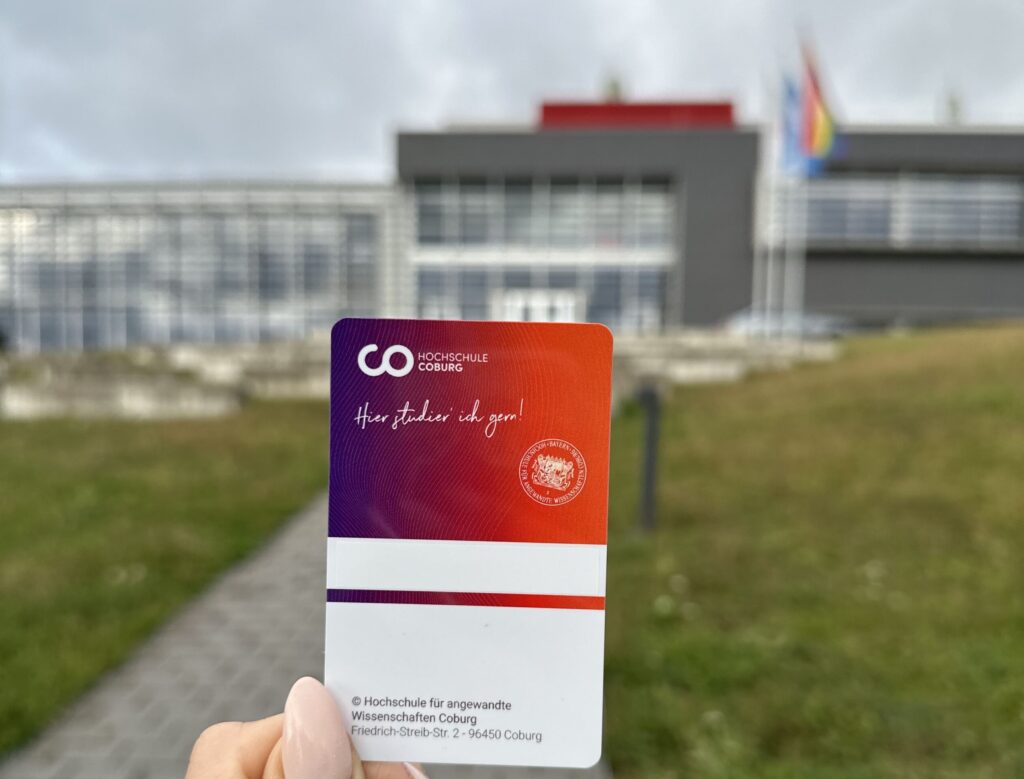Your steps before starting your studies
Now you're ready to go
You have successfully enrolled at Coburg University of Applied Sciences.
Now you are officially a student with us.
You can find all the dates for the start of your studies here.
These steps are now important for your successful start with us:
1. activate user account
As a student at Coburg University of Applied Sciences, you have your own user account.
The account has already been created for you and must be activated by you before you start your studies.
You can only activate your user account after you have enrolled.
You will need your user account for:
- Access to our student portal my campus with links to all online services (Primuss, Moodle, e-mail) of the university
- Access to your e-mail account
- Registration in the WLAN network "HS-Coburg"
- Use of PC workstations at the university
- Use of the central FollowMe printing system
- Access to the university servers (internal and external)
2. instructions for activating your user account
You can activate your user account one day after your successful enrollment at Coburg University of Applied Sciences.
The following steps are necessary:
- You will need your matriculation number to activate your user account.
You can find this on your registration certificate. - Follow the link https://www.hs-coburg.de/freischaltung and enter your details there.
- You will then receive your user name and your university e-mail address.
With the username and password you have set, you can now log in to your student university account and use numerous university IT services. - Please also note the information on secure login with multi-factor authentication.
3. mycampus - our student portal
After activating your user account, you will have access to our student portal mycampus.
The mycampus student portal is the central platform for your studies at Coburg University of Applied Sciences.
In mycampus you will find:
- News and updates from your degree program
- Program-specific documents and forms (module handbooks, timetables and examination schedules, internships, etc.)
- Special services for students
- Latest news from Coburg University of Applied Sciences
- Interesting event dates
As soon as you are logged in to mycampus, you have direct access to the menu item "My services":
- PRIMUSS
- Moodle
- your university e-mail inbox, and much more.
We have summarized here what options the individual online services offer you and how you can find our services on mycampus.
Tutorial - all functions in mycampus briefly explained
You are currently viewing a placeholder content from YouTube. To access the actual content, click the button below. Please note that doing so will share data with third-party providers.
More InformationOther platforms - essential for your studies
PRIMUSS
The PRIMUSS portal contains all the functions you need to organize your studies.
Via PRIMUSS you can:
- retrieve and print out your certificate of enrollment
- complete the enrollment for electives in your degree program
- Register for exams
- view your exam results and grades and create a grade sheet
- re-register for the next semester
- Enter address changes
- register for university sports courses
- and much more.
Moodle
The Moodle learning platform gives you access to lecture notes from lectures, seminars and tutorials.
It is also the ideal place to carry out group work digitally.
In your course-specific introduction at the start of the semester, you will receive an introduction to using Moodle.
A short digital introduction is also available on Moodle itself.
If you have any questions about specific course access (enrolment key) or specific course content, please contact the teacher responsible for the relevant course.
You can also find the link to Moodle under "My services" in mycampus.
Once your student user account has been activated, a university email account with your personal email address will automatically be set up for you.
Your e-mail address is usually structured as follows: vorname.nachname@stud.hs-coburg.de.
You can send your e-mails via the university's Outlook web access https://outlook.office.com .
Note: The login name when logging in is "Your username@hs-coburg.de" (not your e-mail address).
You can find further information on our student portal my campus.
Please check your emails regularly.
You will receive push notifications as soon as there is new information about your studies on mycampus.
Microsoft Teams
Microsoft Teams is available to make it easier for you to communicate with your fellow students.
The most important functions are
- Sending and receiving confidential messages
- Direct messages from person to person
- Topic-related closed groups
- Fast file exchange
- Audio/video chats in groups or with individual (also external) persons
- Alternative to using private messengers
Login: https://teams.microsoft.com ( login name is"Dein Nutzername@hs-coburg.de") Further information can be found on the IT Service page and on our student portal mycampus.
Service facilities

Throughout your studies, Coburg University of Applied Sciences will support you with various services.
You can find a complete overview of our individual service facilities here.
The specific services offered by our service centers can be found on our student portal mycampus under the "Service" section.
You have the option of subscribing directly to the messages from the service facilities so that you don't miss any current offers and events.
Student ID card

Throughout your studies, Coburg University of Applied Sciences will support you with various services.
You can find a complete overview of our individual service facilities here.
The specific services offered by our service centers can be found on our student portal mycampus under the "Service" section.
You have the option of subscribing directly to the messages from the service facilities so that you don't miss any current offers and events.
Semester ticket
What you should also do
Problems with the technology?Our IT service can help
Our IT service is your first point of contact for questions and problems relating to the university's IT services and will help you with:
- the configuration of university IT services on personal computers and mobile devices
- setting up the WLAN (eduroam)
- the printing system (FollowMe)
- and much more.
The offer is free of charge for students.
The university also provides software that you can use on your private computer at a reduced price or even free of charge during your studies.
Further information, instructions for software installations and access to the online services can be found on the IT Service service page on the mycampus student portal or directly from the IT Service.


